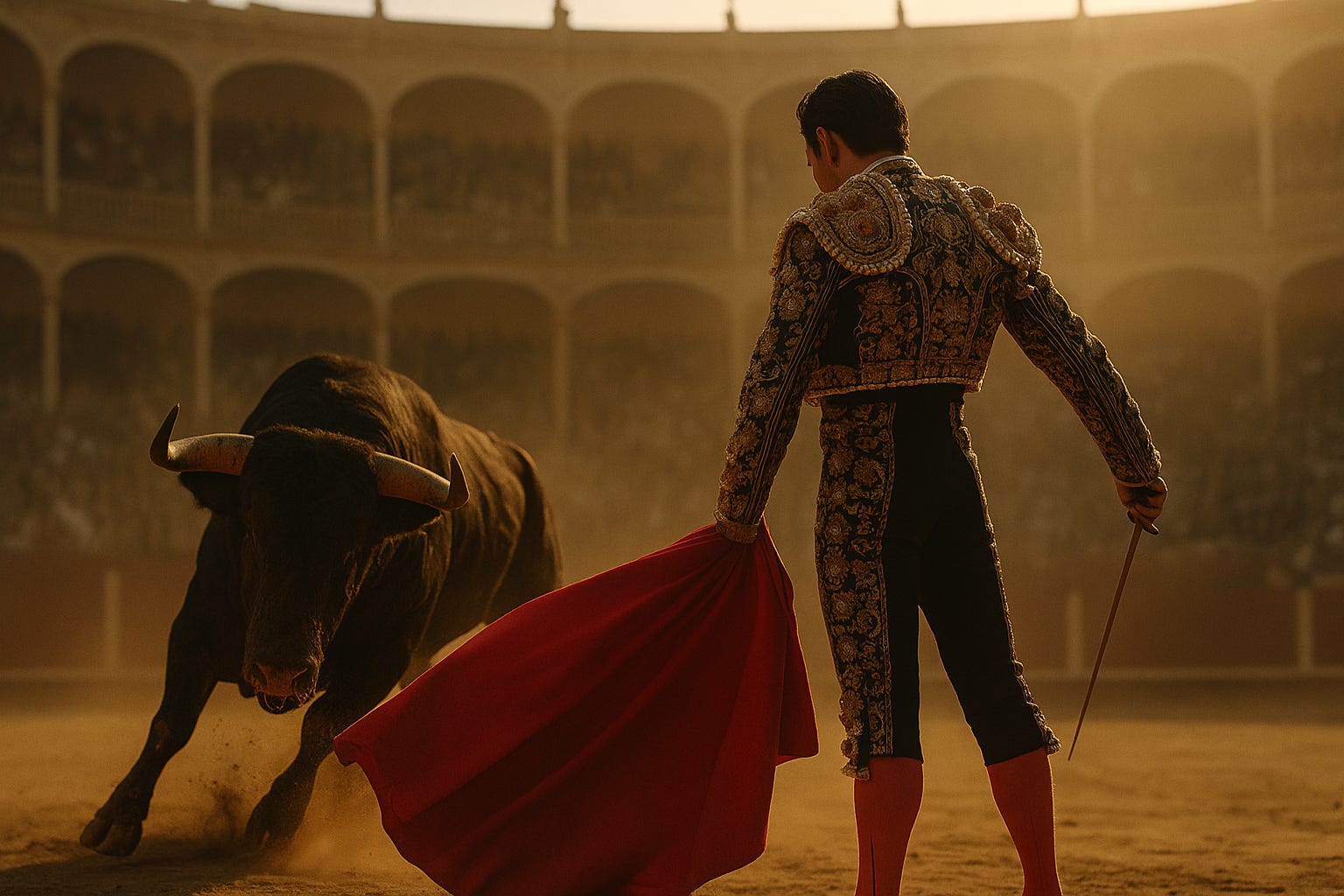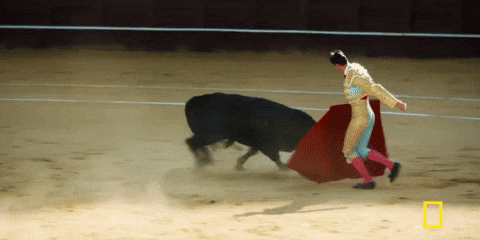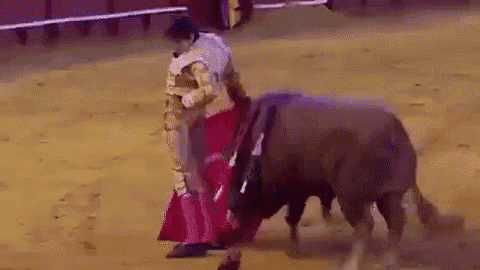The Red Cloak and the Real Matador
Why Elections No Longer Matter in the West
We were taught that democracy gives us power. That our vote shapes the future. But after a century of elections, the real lesson is this: the script doesn’t change. Only the actors do.
This isn’t a call for apathy. It’s an attempt to see clearly. The matador stands firm. The bull keeps charging the cloak.
The Red Cloak
Elections are the West’s civic theatre. We line up, cast a vote, and pretend it matters. Some cheer, some rage. Nothing essential moves.
We’re told our vote counts. That this is government by the people. But the slogans change, not the structure. The faces rotate. The machine stays.
In Sweden, voters thought they’d forced a shift. A “conservative” government backed by the Sweden Democrats—the supposed rebels. But no break with the old order followed. No mass deportations. No battle with state media. Not even a symbolic gesture. They’re now caretakers of the very system they swore to dismantle.
Trump played the same game on a louder stage. He promised to drain the swamp, kill the deep state. Then he filled it with recycled loyalists. The bureaucracy remained. So did the wars, the debt, the surveillance, the universities, the NGOs. The real state never flinched.
Yes, he signed some orders. Cut some taxes. But the machine didn’t bend. He couldn’t fire most of them. Couldn’t shift the gears. When the data embarrassed him, he tried to fire the statisticians.
This wasn’t incompetence. It was design. Western democracies have grown into self-defending organisms. Elections don’t disrupt. They defuse. The people scream, vote, and go home. The unelected stay and steer.
We’ve confused the cloak for the killer. In bullfighting, the cloth distracts while the sword does its work. The bull charges the decoy, not the man holding the blade. That’s our modern election. Bright, noisy, pointless.
The real power sits elsewhere. In ministries, courts, universities, think tanks, commissions, NGOs, boardrooms, algorithms. You don’t vote for them. And even if you could, it wouldn’t matter.
In newer democracies—Eastern Europe, parts of Asia, Latin America—elections can still crack the shell. Governments fall. Institutions collapse. But here? Nothing breaks. Not really. The system digests every threat.
Here’s what they won’t say: you can swap the cast, but not the script. That’s the function of the cloak. Keep the bull busy. Keep the crowd entertained. Keep the matador untouched.
The Real Matador
Most people still believe elections decide power. They don’t. They decide who stands in front of it.
Real power lives in the institutions that don’t change. Agencies, courts, commissions, universities, foundations. The signs on the doors may change. The gears underneath don’t.
When politicians try to steer the machine, it politely resists. A memo vanishes. A court delays. A committee reroutes. It’s not sabotage. It’s protocol. The state defends itself with silence and stalling.
This isn’t conspiracy. It’s administration. The system is built to take hits and stay standing. One minister? Ignore him. One noisy president? Wait him out. He leaves. You stay.
In Sweden, civil servants run everything from zoning to education. No one votes for them. Few even know who they are. Ministers follow their advice, then take the blame when it fails. That’s the arrangement.
In the US, it works a bit different but not better. The executive is wrapped in legal tape. Entire agencies exist to constrain the president. Try to cut through and the system responds like an immune reaction—leaks, probes, resignations. Not loud, but lethal.
This isn’t just about process. It’s about belief. The permanent class shares the same worldview—open borders, market worship, global norms, polite secularism. Parties squabble over spending. The unelected never change their minds.
When you vote, you choose the receptionist. The back room is staffed by lifers. They know the system. They built it. And they’ll defend it if you try to touch it.
That’s why “winning” changes so little. If your victory threatens the structure, the structure bleeds it dry. Not with guns. With meetings. With delays. With rules.
The matador doesn’t scream or chase. He waits. He’s calm. He knows how this ends. He holds the sword. You charge the cloth.
The Game Is Rigged
Democracy still exists—on paper. Ballots get cast. Winners are declared. But real change? That’s rare. The system is designed to survive whoever wins.
Manipulation doesn’t always wear a uniform. It’s quiet. Uneven turnout. Bureaucratic games. Pressure applied in the right places. Analysts catch the patterns—too many clean victories in just the right districts, too much passion where it’s politically useful.
In the West, fraud is uncommon. It’s hard to fake an election across thousands of polling stations. But that misses the point. The fix happens earlier—through media framing, institutional bias, filtered information. Elections aren’t stolen at the polls. They’re staged in advance.
Foreign campaigns, algorithmic targeting, subtle censorship—these shape what voters see and think long before they touch a ballot. You believe you’re choosing freely. But the menu was set weeks ago.
Take Europe. No one’s flipping vote counts. But operations—especially from Russia—have inflamed mistrust and cracked consensus. Yes, it’s real. Some in the dissident right don’t want to hear that. Don’t be silly. And don’t be naive. The West runs its own psy-ops, just with better PR.
This is the real trick. The election happens. The vote is counted. But the ground was tilted long before. Global NGOs, corporate media, supranational institutions—they set the terms, then act surprised when the outcome favors them.
In places like Eastern Europe or Latin America, fraud is messier—ballot-stuffing, intimidation, fake IDs. But the purpose is the same. Not to win cleanly. To win legitimately. To say, “Look, we followed the rules.”
The West doesn’t need that. It has something smoother. A system that adapts, absorbs, disarms. When pressure builds, new ethics panels appear. New standards. New vocabulary. The media doesn’t debate. It quarantines.
Elections in this model aren’t tools of control. They’re rituals of containment. They let people feel heard without being listened to. Enough drama to seem real. Enough variation to stay interesting. But never enough to break the pattern.
In the U.S., even questioning the outcome sparks hysteria. Not because it’s false, but because doubt itself is dangerous. In 2020, Republicans who refused to back the narrative were sidelined. The system turned its knives inward to protect itself.
That’s how it works. When the structure feels threatened, it doesn’t shout. It whispers: don’t trust the vote. Once enough people believe that, nothing needs to change. Paralysis looks like peace.
The game was rigged before it started. The rules. The refs. The shape of the field. You’re allowed to win—if winning leaves the architecture intact.
But when someone doesn’t play along, the response is blunt: exile or obedience.
Golden Dawn in Greece. Vlaams Blok in Belgium. When they grew too sharp, they were crushed. Criminalized. Erased. Brussels didn’t flinch.
Others were welcomed in and neutered. Meloni roared, then saluted NATO. Sweden’s nationalists promised major reforms. But when it came to policy, the results were underwhelming.
They failed on AR‑15 reform. Before the election, SD promised they’d never support a ban. Then a school shooting happened. They folded. The weapon used wasn’t even an AR‑15, but that didn’t matter. They reversed course and backed new restrictions anyway. It was a pure test of spine, and they failed it.
They made big promises about returning immigrants. Yet little happened. No coherent return program emerged. Some pilot projects, but no rollout. Bluster, not delivery.
They pledged to tighten citizenship. Instead, hundreds of thousands of new passports were issued under this government. Naturalization skyrocketed even as stricter rules were floated. The system remained lenient.
This is not compromise. It’s co-option. You win seats. You join the system. But the system wins your promises.
That’s the deal for nationalist parties: you can fade on your own, or fade inside the system. Either way, the matador holds the sword.
See the Matador, Not the Cloak
We’ve pulled back the curtain. We’ve seen the theatre. So now what? If elections don’t shift power, where does power actually live?
Not in revolutions. Not in party platforms. It lives in parallel structures—schools, families, communities. Places where life actually happens. Where values are taught, needs are met, and habits form.
In Sweden, civic associations, neighborhood groups, cultural clubs, and informal business circles carry real weight. They teach, feed, gather, fix. No politician appoints the local festival committee or runs the youth football league. These aren’t just bulletin boards for state messaging. They’re living structures.
In the U.S., look at homeschooling, co‑ops, church schools, small media projects. They build lasting culture, not campaign noise. Their influence doesn’t swing with the polls. It grows through loyalty and work.
These networks don’t ask permission. They don’t need political blessing. They run on trust, repetition, shared responsibility. If the state pushes too hard, they don’t protest. They adapt.
That’s what the system fears. Bottom-up institutions can’t be voted out. They don’t rise by PR. They rise by doing. They last because they matter.
It’s not easy. Some fail. Others rot from comfort or get co-opted. But systems aren’t built on perfection. They’re built on density. A few solid nodes can carry a whole grid.
So no, voting harder isn’t the answer. Arguing louder won’t help either. That’s cloak-chasing. What matters is creating new arenas. Quiet spaces where power doesn’t need applause.—libraries, farms, schools, cooperatives, currency schemes, online guilds.
Think of them as resilience infrastructure. When parties collapse or the market hiccups, these don’t flinch. They still feed. They still teach. They still bind people together. They’re your lifeboat, not your flag.
Old traditions understood this. Families, churches, cultural clubs—they preserved identity without asking the state’s opinion. When the center weakens, these bonds tighten. When the official system cracks, these hold fast.
Loyalty to the tangible over the televised. Serve your town. Feed someone near you. Teach your child what the world won’t. Do it for a decade and watch what grows.
When enough of these nodes connect, they don’t need elections. They are the power. Not loud. Not fragile. Just rooted. They decide things by showing up, not showing off.
So stop watching the cloak. Change the arena. Build what can't be undone by a vote. Serve. Endure. Link up. That’s where the real matador stands.
■








Great article
Thank you for telling the truth. So, if we want to get a better life and society, we need to change arenas, that is what you say? I hear that trying to reform the society as it is today is not worthwhile, but how can we be sure that we even have the freedom to chose arenas?